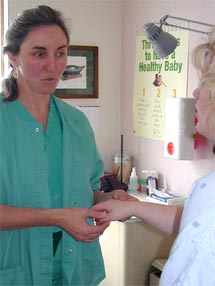 |
Physician
Assistants (PA) are licensed or registered healthcare professionals who
practice with physician supervision. They may be found practicing in all
specialties of medicine and may be geographically removed from their supervising
physician. Physician Assistants practice following the medical
care model.
Services that Physician
Assistants perform can include:
- Evaluation - Eliciting
a detailed medical history, performing an appropriate physical examination,
delineating problems, and recording information in the medical record.
- Monitoring - Assisting
the physician in developing and implementing patient management plans,
recording progress notes in office-based and inpatient health care settings.
- Diagnostics - Performing
and interpreting (at least to the point of recognizing deviations from
the norm) common laboratory, radiologic, cardiographic, and other routine
diagnostic procedures used to identify pathophysiologic processes.
- Therapeutics -
Performing routine procedures such as infections, immunizations, suturing
and wound care, managing simple conditions produced by infection or
trauma, participating in the management of more complex illness and
injury, and taking initiative in performing evaluation and therapeutic
procedures in response to life-threatening situations.
- Counseling - Instructing
and counseling patients regarding compliance with prescribed therapeutic
regimens, normal growth and development, family planning, situational
adjustment reactions and health maintenance.
- Referral - Facilitating
the referral patients to the community's health and social service agencies
when appropriate.
(http://www.medinfo.ufl.edu/pa/program/pa.htm)
"The extent of
the involvement by physician assistants in the assessment and treatment
of patients depends largely on the complexity and acuity of the patient's
condition as well as their training, experience, and preparation as adjudged
by the supervising physician." (http://www.medinfo.ufl.cdu/pa/program/pa.htm)
|
